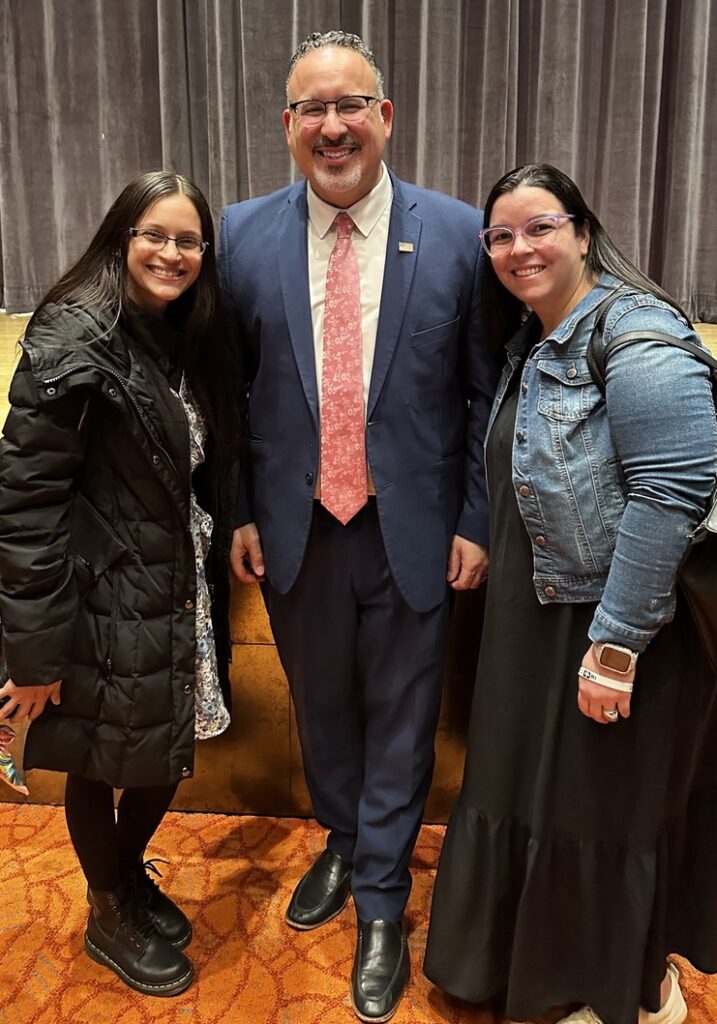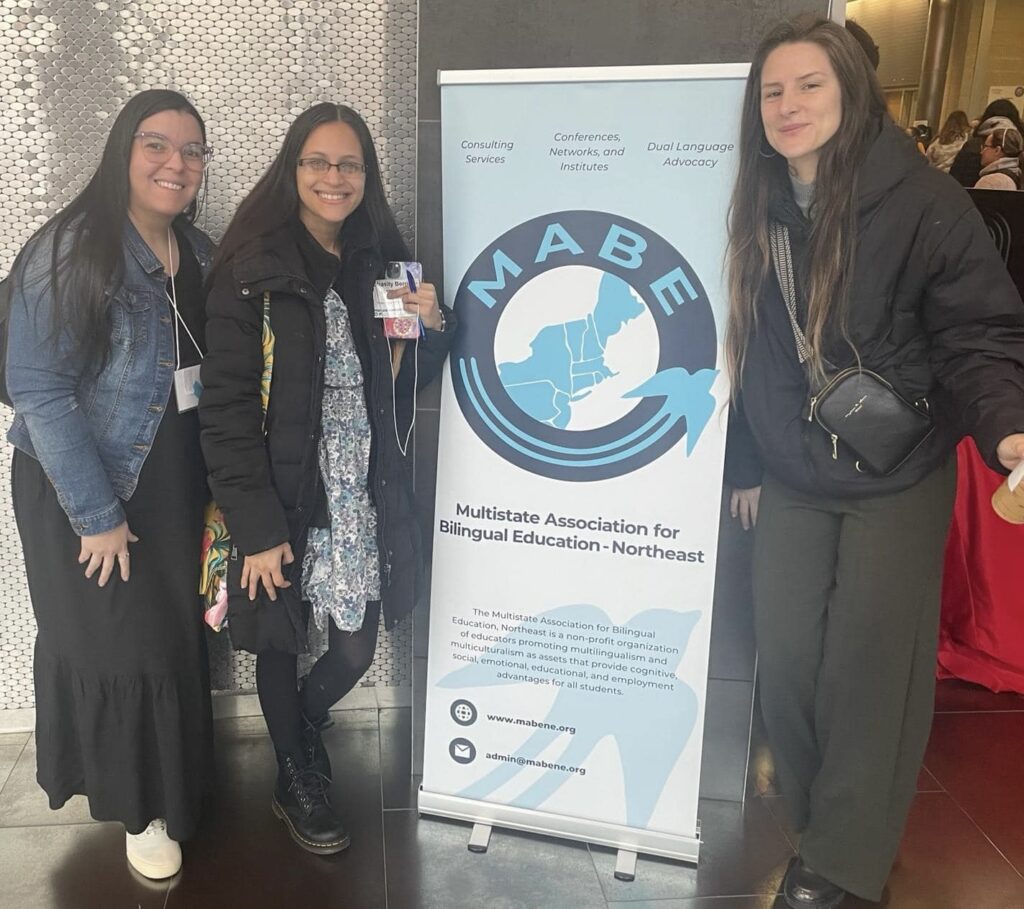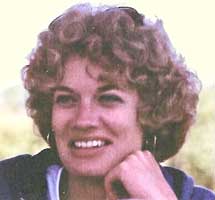Alma Exley Scholars honored in 1998 and 2017 recently connected at an educational conference in Providence, Rhode Island, and learned they had a lot in common.
Por favor desplácese hasta el final de la historia para leerlo en Español.
U.S. Secretary of Education Miguel Cardona was the keynote speaker at the Northeast Regional Conference of the Multistate Association for Bilingual Education (MABE). Chastity Berrios Hernández was attending as a bilingual teacher at Clinton Elementary School in New Haven.

Dr. Miguel Cardona with Chastity Berrios Hernández, left, and Marnelia Martïnez, also a bilingual teacher at Clinton School in New Haven.
Speaking Up at a Young Age
Dr. Cardona spoke about a turning point when he was a young student in Meriden, Connecticut.
“Up until middle school, they called me Michael in school,” he said. “One day in seventh grade I asked my mother what it said on my birth certificate, and she said it was Miguel.
“The next day I went to the office and respectfully got the attention of the secretary. I asked her to make sure that all the school records listed my name as Miguel. From that day forward, I was Miguel in school.
“For me, that name became such a central part of me,” he said. “My parents had taught me to be unapologetically me, to embrace my identity, my culture, and my home language as the superpowers that they are.
“As my career has progressed, I’ve become more vocal about it,” the Secretary said. “When the President introduced me as Secretary of Education, I said I was as American as apple pie—and rice and beans.
A Culture of Low Expectations
“For far too long, our multilingual, multicultural students have internalized a culture of low expectations,” he said. “Their backgrounds have been treated as deficits to be overcome rather than assets to make their classrooms and their communities stronger.
“That’s unacceptable. That’s why I have worked so hard to raise the bar in education for our multilingual learners. That’s why I have traveled the country to speak at conferences like this to emphasize the countless academic and economic benefits of dual-language programs.”

Chastity Berrios Hernández with Marnelia Martïnez and Melanie Rodriguez, right.
Importance of Speaking Up
Ms. Berrios told me that she loved hearing that young Miguel Cardona had taken the initiative to speak up for himself. “Unfortunately,” she said, “many students don’t do so, thinking it will be considered disrespectful or out of line.
“For too long, bilingualism in the USA has mostly been viewed negatively and as a burden or deficiency,” she said. “However, identity starts with one’s name, which should be written and pronounced correctly.
“If we educators want to honor students, the first step is to write and say their names correctly. Honoring who they are and where they come from fosters culturally responsive teaching and learning.
“Like Dr. Cardona, I learned that I had to find the courage at a young age to speak up for myself unapologetically,” Ms. Berrios said. “When I entered Clinton Avenue School as a fourth grader, I had just arrived from Puerto Rico. My English was limited. I had left everything behind—friends, family, school—to dive into my new reality. I was facing a new culture, language, and traditions.
“At home, the message was that to be fully bilingual was a good thing. But my new world seemed to be presenting a different message of discomfort for those who spoke only one language.
“I have learned over the years to embrace my story,” she told me. “I wanted to become the example—as a teacher of color—that I wish I had seen when I was growing up.
“Mi identidad Boricua es todo para mi. (My Puerto Rican identify is everything for me.) Being able to speak Spanish and English has opened up deep layers of understanding for me.”
It gives me great pleasure to tell this story of Ms. Berrios and Dr. Cardona, who are among the more than 30 outstanding Alma Exley Scholars who are making a difference in the lives of countless students in many different ways at the local and national levels.
- Woody Exley
Destacando la educación bilingüe
Los becarios Alma Exley ganado en 1998 y 2017 se conectaron recientemente en una conferencia educativa en Providence, Rhode Island, y aprendieron que tenían mucho en común.
El Secretario de Educación de los Estados Unidos, Miguel Cardona, fue el orador principal en la Conferencia Regional Noreste de la Asociación Multiestelar para la Educación Bilingüe (MABE). Chastity Berrios Hernández asistía como maestra bilingüe en la Escuela Primaria Clinton en New Haven.
Hablar a una edad temprana
El Dr. Cardona habló sobre un punto de inflexión cuando era un joven estudiante en Meriden, Connecticut.
“Hasta la secundaria, me llamaban Michael en la escuela”, dijo. “Un día en séptimo grado le pregunté a mi mamá qué decía mi acta de nacimiento y me dijo que era Miguel.
“Al día siguiente fui a la oficina y respetuosamente llamé la atención de la secretaria. Le pedí que se asegurara de que todos los registros escolares indicaran mi nombre como Miguel. A partir de ese día fui Miguel en la escuela.
“Para mí, ese nombre se convirtió en una parte central de mí”, dijo. “Mis padres me habían enseñado a ser yo sin pedir disculpas, a aceptar mi identidad, mi cultura y mi lengua materna como los superpoderes que son.
“A medida que mi carrera ha progresado, he hablado más al respecto”, dijo el secretario. “Cuando el presidente me presentó como Secretario de Educación, dije que era tan estadounidense como el pastel de manzana… y el arroz y las habichuelas (frijoles).
Una cultura de bajas expectativas
“Durante demasiado tiempo, nuestros estudiantes multilingües y multiculturales han internalizado una cultura de bajas expectativas”, dijo. “Sus antecedentes han sido tratados como déficits que deben superarse en lugar de activos para fortalecer sus aulas y sus comunidades.
“Eso es inaceptable. Por eso he trabajado tan duro para elevar el nivel de la educación para nuestros estudiantes multilingües. Es por eso que he viajado por todo el país para hablar en conferencias como ésta para enfatizar los innumerables beneficios académicos y económicos de los programas bilingües”.
Importancia de hablar
La Sra. Berríos me dijo que le encantó escuchar que el joven Miguel Cardona había tomado la iniciativa de hablar por sí mismo. “Desafortunadamente”, dijo, “muchos estudiantes no lo hacen, pensando que se considerará irrespetuoso o fuera de lugar.
“Durante demasiado tiempo, el bilingüismo en Estados Unidos ha sido visto de forma negativa y como una carga o una deficiencia”, afirmó. “Sin embargo, la identidad comienza con el nombre, que debe escribirse y pronunciarse correctamente.
“Si los educadores queremos honrar a los estudiantes, el primer paso es escribir y decir correctamente sus nombres. Honrar quiénes son y de dónde vienen fomenta la enseñanza y el aprendizaje culturalmente receptivos.
“Al igual que el Dr. Cardona, aprendí que tenía que encontrar el coraje a una edad temprana para hablar por mí misma sin pedir disculpas”, dijo la Sra. Berrios. “Cuando entré a la Escuela Clinton Avenue como estudiante de cuarto grado, acababa de llegar de Puerto Rico. Mi inglés era limitado. Había dejado todo atrás (amigos, familia, escuela) para sumergirme en mi nueva realidad. Me enfrentaba a una nueva cultura, idioma y tradiciones.
“En casa, el mensaje era que ser completamente bilingüe era algo bueno. Pero mi nuevo mundo parecía presentar un mensaje diferente de malestar para quienes hablaban un solo idioma.
“A lo largo de los años, he aprendido a aceptar mi historia”, me dijo. “Quería convertirme en el ejemplo, como maestro de color, que desearía haber visto cuando era niño.
“Mi identidad Boricua es todo para mí. (Mi identidad puertorriqueña lo es todo para mí). Poder hablar español e inglés me ha abierto profundos niveles de comprensión y de cómo interactúo con los demás reconociendo los diferentes dialectos”
Es un gran placer para mí contar esta historia de la Sra. Berrios y el Dr. Cardona, quienes se encuentran entre los más de 30 destacados becarios Alma Exley que están marcando una diferencia en las vidas de innumerables estudiantes de muchas maneras diferentes a nivel local y nacional.
– Woody Exley
(Muchas gracias a Chastity Berrios Hernández por la traducción.)
